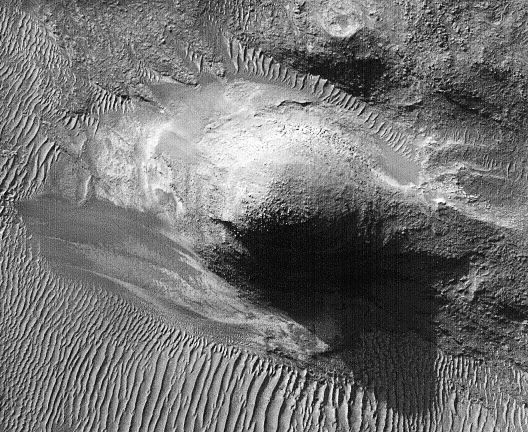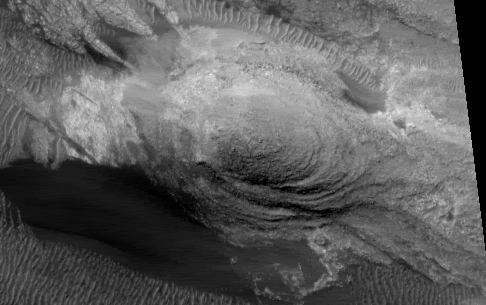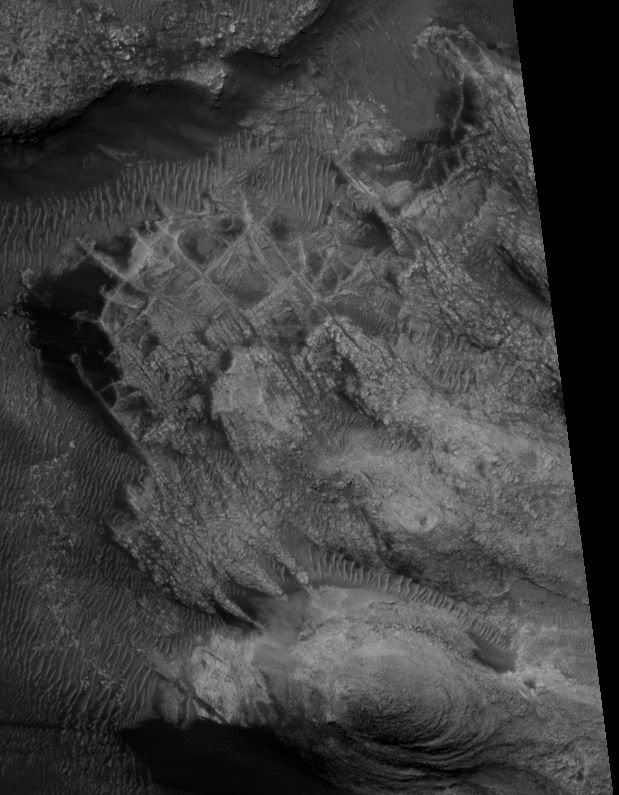- Thank you received: 0
A Geoglyph re-imaged... Parrotopia
- neilderosa
-
Topic Author
- Offline
- Platinum Member
-

Less
More
18 years 7 months ago #4203
by neilderosa
Reply from Neil DeRosa was created by neilderosa
<blockquote id="quote"><font size="2" face="Verdana, Arial, Helvetica" id="quote">quote:<hr height="1" noshade id="quote">The point of even making this post is simple I requested that this area be re-imaged last year and last month that image was acquired. In fact it is almost a duplicate run of the first strip but does contain a little more information of the right side of the glyph which would be the parrot tail. I think it is important that when an object is seen and then reaffirmed to bring it forward.
The second image does not make the glyph look better than the original in fact it is somewhat diminished in appearance but under different sun angles, different time of day and different time of the year the image persists. Many of the details are there from the claws now slightly hidden in shadow to the head very prominantly featured overall. [starjim]
<hr height="1" noshade id="quote"></blockquote id="quote"></font id="quote">
Thanks for posting this new information. Wil Faust's Parrot fascinates me for a number of reasons, and I'm glad there is now a confirming image of M14. I cropped and contrast enhanced the new image and post it here along with the original.
S2000165, Parrot
M1402185, Parrot
From the aquisition parameters we know that M14 was imaged in southern summer in mid afternoon, and from almost directly overhead. S20 was imaged in southern winter around the same time of day, from an emmision (camera) angle of 18 degrees from the perpendicular. M14 has slightly better resolution. The differences we see in the two images confirm these variables.
Perhaps viewers can see the differences and some of the reasons for them at a glance.
Neil
The second image does not make the glyph look better than the original in fact it is somewhat diminished in appearance but under different sun angles, different time of day and different time of the year the image persists. Many of the details are there from the claws now slightly hidden in shadow to the head very prominantly featured overall. [starjim]
<hr height="1" noshade id="quote"></blockquote id="quote"></font id="quote">
Thanks for posting this new information. Wil Faust's Parrot fascinates me for a number of reasons, and I'm glad there is now a confirming image of M14. I cropped and contrast enhanced the new image and post it here along with the original.
S2000165, Parrot
M1402185, Parrot
From the aquisition parameters we know that M14 was imaged in southern summer in mid afternoon, and from almost directly overhead. S20 was imaged in southern winter around the same time of day, from an emmision (camera) angle of 18 degrees from the perpendicular. M14 has slightly better resolution. The differences we see in the two images confirm these variables.
Perhaps viewers can see the differences and some of the reasons for them at a glance.
Neil
Please Log in or Create an account to join the conversation.
- neilderosa
-
Topic Author
- Offline
- Platinum Member
-

Less
More
- Thank you received: 0
18 years 7 months ago #9189
by neilderosa
Replied by neilderosa on topic Reply from Neil DeRosa
<blockquote id="quote"><font size="2" face="Verdana, Arial, Helvetica" id="quote">quote:<hr height="1" noshade id="quote">Perhaps viewers can see the differences and some of the reasons for them at a glance.<hr height="1" noshade id="quote"></blockquote id="quote"></font id="quote">
No? Okay, I'll list a few.
1- We see some foreshortening of the parrot's overall length. The images are not scaled to each other but S20 appears a little squatter than M14 as would be expected, due to the increased emmission angle.
2-There is a large "winter shadow" under the parrot's body due to the lower angle of the winter sun, as would be expected. This shadow makes clear (it wasn't clear in M14) that the body section of the parrot is a large mound, artfully sculpted in our deductive model.
3- Interestingly, there is a clearing under the bird's head and breast that wasn't as obvious in M14. It seems fairly obvious now that this clearing is an artistic effect, perhaps the artist's intent was to "frame" the Mars-glyph in a sense. In fact all of the natural erosion ripples have been cleared away where the parrot is located--even the ground level parts of the parrot.
3- We see a darker shadow outlining the parrot's leg and claw which reinforces the prediction that the leg and claw are both etched and raised-relief (i.e. sculpted). This feature was more vague in M14. So the new image provides <i>a priori </i>validation of this model. Conversely, we see a bright reflective line outlining the lower beak or jaw that was not obvious before. This again reinforces the raised-relief model, because for the sun to now reflect that line brightly, it would have to be sloped toward the sun, as in a raised feature just happening to coincide with the shape of a parrot's lower beak.
4- As Jim pointed out above, many of the other details and features, although not exactly the same, hold their own in the new image. (This is true of the head details, wings, tail, tarsus, metatarsus, claw, beak, jaw, tounge, and the feather in the parrot's mouth.)
All in all this adds up to a decent <i>a priori </i>confirmation of the artificiality of the parrot in many respects.
Neil
No? Okay, I'll list a few.
1- We see some foreshortening of the parrot's overall length. The images are not scaled to each other but S20 appears a little squatter than M14 as would be expected, due to the increased emmission angle.
2-There is a large "winter shadow" under the parrot's body due to the lower angle of the winter sun, as would be expected. This shadow makes clear (it wasn't clear in M14) that the body section of the parrot is a large mound, artfully sculpted in our deductive model.
3- Interestingly, there is a clearing under the bird's head and breast that wasn't as obvious in M14. It seems fairly obvious now that this clearing is an artistic effect, perhaps the artist's intent was to "frame" the Mars-glyph in a sense. In fact all of the natural erosion ripples have been cleared away where the parrot is located--even the ground level parts of the parrot.
3- We see a darker shadow outlining the parrot's leg and claw which reinforces the prediction that the leg and claw are both etched and raised-relief (i.e. sculpted). This feature was more vague in M14. So the new image provides <i>a priori </i>validation of this model. Conversely, we see a bright reflective line outlining the lower beak or jaw that was not obvious before. This again reinforces the raised-relief model, because for the sun to now reflect that line brightly, it would have to be sloped toward the sun, as in a raised feature just happening to coincide with the shape of a parrot's lower beak.
4- As Jim pointed out above, many of the other details and features, although not exactly the same, hold their own in the new image. (This is true of the head details, wings, tail, tarsus, metatarsus, claw, beak, jaw, tounge, and the feather in the parrot's mouth.)
All in all this adds up to a decent <i>a priori </i>confirmation of the artificiality of the parrot in many respects.
Neil
Please Log in or Create an account to join the conversation.
- neilderosa
-
Topic Author
- Offline
- Platinum Member
-

Less
More
- Thank you received: 0
18 years 7 months ago #4218
by neilderosa
Replied by neilderosa on topic Reply from Neil DeRosa
<blockquote id="quote"><font size="2" face="Verdana, Arial, Helvetica" id="quote">quote:<hr height="1" noshade id="quote">All in all this adds up to a decent a priori confirmation of the artificiality of the parrot in many respects.<hr height="1" noshade id="quote"></blockquote id="quote"></font id="quote">
The same holds true, I'm inclined to think, of the very suggestive street (or tube network) ruins that Wil had dubbed "Parrotopia," (also previously posted and discussed on the MR message board).
I bring it back to show it in context to the new discussion of the parrot. There do seem to be a network of interconnected streets, and the ruins of structures, some quite alien looking. Note for example the "beatle-like" structure in the upper right of the cropping. Also interesting from my point of view is the "city's" location. It is nestled in a protected valley just at the foot of an escarpment to a higher land formation or mountain--just like earth cities often are.
This cropping is compressed so it would work on a web page, but the viewer can crop the original gif and get a little more (but not much more) definition out of it. Here is another feature that cries out for new higher resolution imaging; M1402185, Parrotopia.
Neil
The same holds true, I'm inclined to think, of the very suggestive street (or tube network) ruins that Wil had dubbed "Parrotopia," (also previously posted and discussed on the MR message board).
I bring it back to show it in context to the new discussion of the parrot. There do seem to be a network of interconnected streets, and the ruins of structures, some quite alien looking. Note for example the "beatle-like" structure in the upper right of the cropping. Also interesting from my point of view is the "city's" location. It is nestled in a protected valley just at the foot of an escarpment to a higher land formation or mountain--just like earth cities often are.
This cropping is compressed so it would work on a web page, but the viewer can crop the original gif and get a little more (but not much more) definition out of it. Here is another feature that cries out for new higher resolution imaging; M1402185, Parrotopia.
Neil
Please Log in or Create an account to join the conversation.
18 years 7 months ago #9256
by Gregg
Replied by Gregg on topic Reply from Gregg Wilson
If these are streets, it implies habitation on the surface. Which, in turn, implies a significant, breathable atmosphere. Yet the parrot is a very Earth based species. So the assumption that the sculpters are quite alien to us may not be valid.
Gregg Wilson
Gregg Wilson
Please Log in or Create an account to join the conversation.
- neilderosa
-
Topic Author
- Offline
- Platinum Member
-

Less
More
- Thank you received: 0
18 years 7 months ago #16095
by neilderosa
Replied by neilderosa on topic Reply from Neil DeRosa
<blockquote id="quote"><font size="2" face="Verdana, Arial, Helvetica" id="quote">quote:<hr height="1" noshade id="quote">Note for example the "beatle-like" structure in the upper right of the cropping. Also interesting from my point of view is the "city's" location.<hr height="1" noshade id="quote"></blockquote id="quote"></font id="quote">
I have noticed several structures similar to this one at other locations (I'll post a couple when I can). In one deductive model, they might be the ruins of pressurized enclosures where humans and other life forms could survive after the atmosphere of Mars was depleted (by mega impacts from an exploded planet perhaps) and the temperature dropped drastically.
In his book, <i>The Case For Mars</i>, Robert Zubrin proposed various types of enclosed domes and semi-domes for just this reason, for dwellings and work areas for Mars settlers.
<blockquote id="quote"><font size="2" face="Verdana, Arial, Helvetica" id="quote">quote:<hr height="1" noshade id="quote">If these are streets, it implies habitation on the surface. Which, in turn, implies a significant, breathable atmosphere. Yet the parrot is a very Earth based species. So the assumption that the sculpters are quite alien to us may not be valid. [Gregg]
<hr height="1" noshade id="quote"></blockquote id="quote"></font id="quote">
I agree they were human, but one of my working theories is that they had a very different evolutionary history from ours and that they may have had some very different animals for example, also different culture and mythology. Also, the streets may be tubes. We can't tell yet. Also (ala Sitchin) they may have given us many of their animals (such as parrots) and plants, such as fruits and vegetables.
Neil
I have noticed several structures similar to this one at other locations (I'll post a couple when I can). In one deductive model, they might be the ruins of pressurized enclosures where humans and other life forms could survive after the atmosphere of Mars was depleted (by mega impacts from an exploded planet perhaps) and the temperature dropped drastically.
In his book, <i>The Case For Mars</i>, Robert Zubrin proposed various types of enclosed domes and semi-domes for just this reason, for dwellings and work areas for Mars settlers.
<blockquote id="quote"><font size="2" face="Verdana, Arial, Helvetica" id="quote">quote:<hr height="1" noshade id="quote">If these are streets, it implies habitation on the surface. Which, in turn, implies a significant, breathable atmosphere. Yet the parrot is a very Earth based species. So the assumption that the sculpters are quite alien to us may not be valid. [Gregg]
<hr height="1" noshade id="quote"></blockquote id="quote"></font id="quote">
I agree they were human, but one of my working theories is that they had a very different evolutionary history from ours and that they may have had some very different animals for example, also different culture and mythology. Also, the streets may be tubes. We can't tell yet. Also (ala Sitchin) they may have given us many of their animals (such as parrots) and plants, such as fruits and vegetables.
Neil
Please Log in or Create an account to join the conversation.
18 years 7 months ago #9257
by Gregg
Replied by Gregg on topic Reply from Gregg Wilson
I agree they were human, but one of my working theories is that they had a very different evolutionary history from ours and that they may have had some very different animals for example, also different culture and mythology. Also, the streets may be tubes. We can't tell yet. Also (ala Sitchin) they may have given us many of their animals (such as parrots) and plants, such as fruits and vegetables.
Neil
[/quote]
No argument with that.
Gregg Wilson
Neil
[/quote]
No argument with that.
Gregg Wilson
Please Log in or Create an account to join the conversation.
Time to create page: 0.382 seconds



